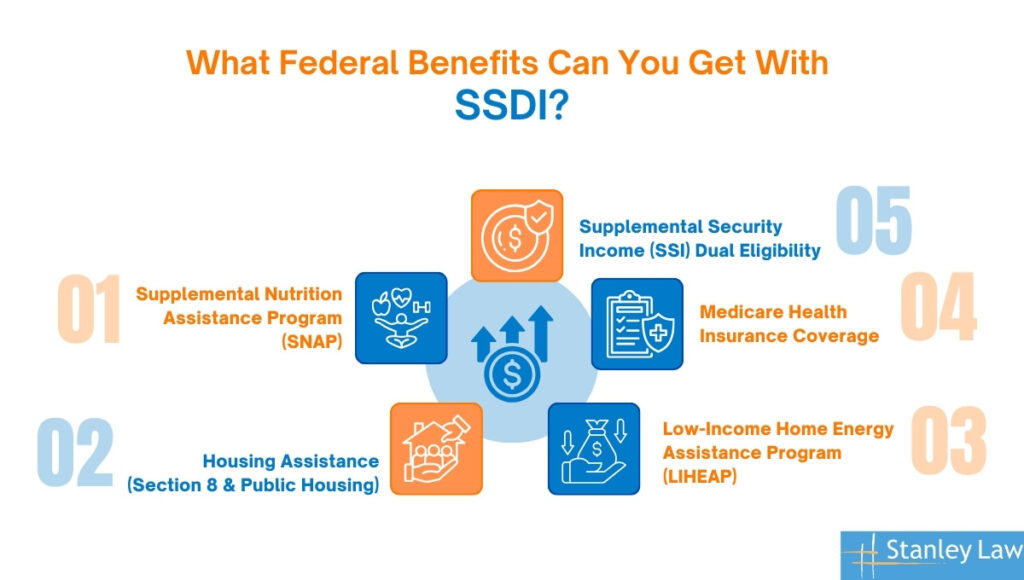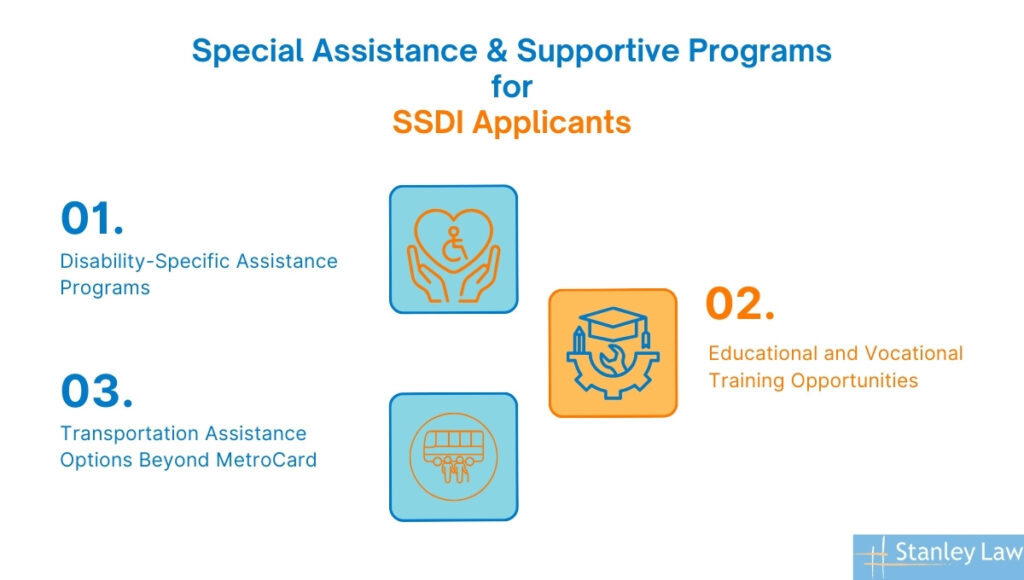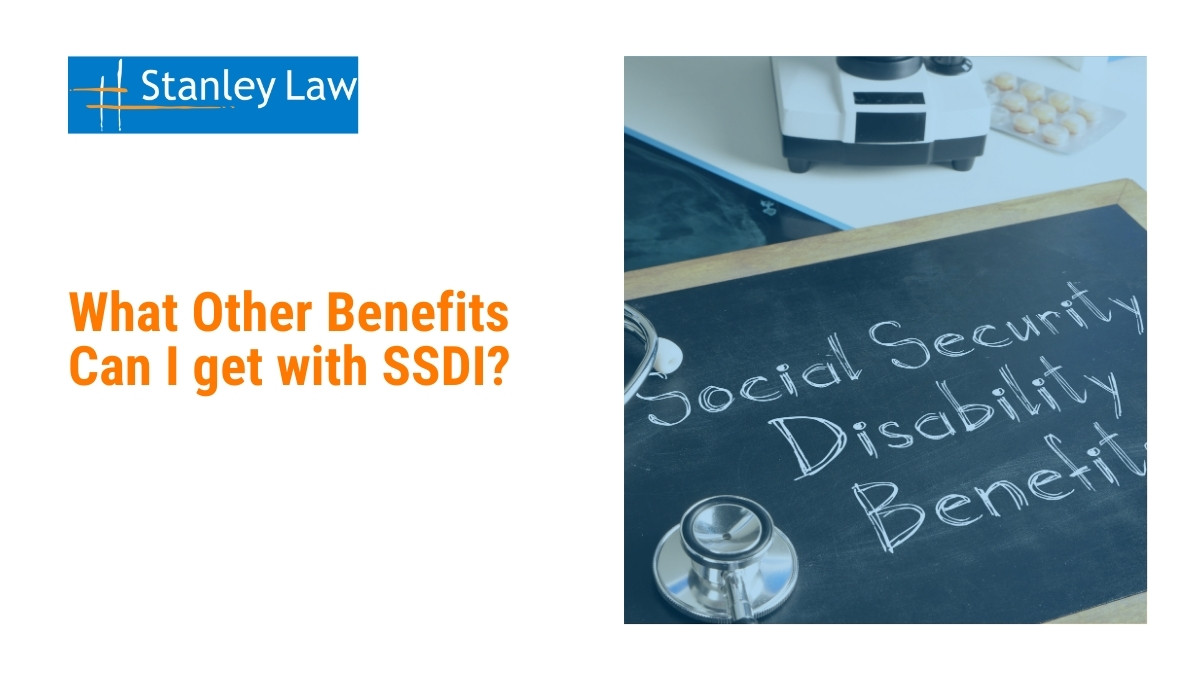Living on SSDI alone is certainly no walk in the park, especially when rent, groceries, and medical costs keep rising. That’s why many people in this situation ask themselves, what other benefits can I get with SSDI? Beyond your monthly check, you may qualify for programs that help with food, housing, energy bills, healthcare, taxes, and legal support.
Plenty of support is accessible to you, from federal programs like SNAP and Medicare, to state-level housing support and energy aid, to free legal assistance when you need it the most. Do your research online and you will find the most effective benefits for SSDI recipients-food, housing, utilities, taxes, and legal help-plus clear steps to apply or appeal successfully.
What Federal Benefits Can You Get with SSDI?
People who receive Social Security Disability Insurance (SSDI) can get help from several federal programs. These programs reduce living costs and support basic needs. Federal benefits include food help, housing aid, utility payments, medical insurance, and cash assistance. Each program has defined rules, but already having SSDI often qualifies you to apply.
Supplemental Nutrition Assistance Program (SNAP)
SNAP gives monthly money for food to low-income people, including those on SSDI. The money comes on an EBT card and can be used at hundreds of grocery and convenience stores across New York and Pennsylvania. Income rules apply, but SSDI counts as income. Many people with SSDI still qualify.
You may get SNAP if you:
- Have high rent or utility costs
- Spend money on medical needs
- Live alone or support dependents
Housing Assistance (Section 8 & Public Housing)
SSDI recipients can apply for housing help through the Department of Housing and Urban Development (HUD). Two major programs are Section 8 and Public Housing.
Section 8 Housing Vouchers:
- Cover part of your rent
- Let you choose where you live
- Require you to pay about 30% of your income
Public Housing:
- Run by local housing agencies
- Serves low-income families, seniors, and people with disabilities
- Often has long waiting lists
You apply at your local housing office and provide proof of your SSDI income.
Low-Income Home Energy Assistance Program (LIHEAP)
LIHEAP helps SSDI recipients pay for heating and cooling costs. It protects households from losing energy services during bad weather.
LIHEAP may offer:
- One-time payments toward bills
- Emergency help to stop disconnections
- Free home upgrades to save energy
Income limits apply. SSDI is counted as income, but many recipients still qualify. You must apply through your state energy office.
Medicare Health Insurance Coverage
SSDI recipients are eligible for Medicare after 24 months of payments. Medicare helps cover doctor visits, hospital care, and medications.
Medicare includes:
- Part A for hospital stays
- Part B for medical care
- Part C for prescriptions
You may also qualify for a Medicare Savings Program if your income is low. These programs lower your monthly costs and cover some services for free.
Supplemental Security Income (SSI) Dual Eligibility
Some people can receive both SSDI and Supplemental Security Income (SSI).
- This is called dual eligibility.
- You may qualify for both if:
- Your SSDI payment is low
- You have little or no income
- You own few resources
SSI provides recipients extra cash each month. It also gives automatic access to Medicaid in most states. People with both benefits often qualify for more public aid.

Special Assistance & Supportive Programs for SSDI Applicants
People who apply for or receive SSDI often need more than just money. Many federal and state programs provide critical help that makes daily life easier. These services improve health, mobility, education, and independence. They focus on real needs, not just financial support.
Disability-Specific Assistance Programs
Some programs are built for people with certain disabilities. These services depend on your diagnosis and needs. They offer tools, training, and daily support to improve quality of life.
Programs may be available for:
- People who are blind or have low vision
- People who are deaf or hard of hearing
- People with developmental or intellectual disabilities
To apply, you often need medical records and proof of SSDI or disability status.
Educational and Vocational Training Opportunities
SSDI recipients may qualify for programs that help them return to work or learn new skills. These services support job training, education, and new career paths.
Common options include:
- Job placement help from state vocational rehab offices;
- College or trade school fee waivers;
- Federal programs that protect SSDI benefits while working.
These programs aim to build long-term independence without losing support during the transition period.
Transportation Assistance Options Beyond MetroCard
Many SSDI recipients need help getting to medical appointments, stores, or jobs. Several transportation programs offer low-cost or free rides based on medical or financial need.
Transportation support may include:
- Paratransit rides for people with mobility issues;
- Non-emergency medical transport for doctor visits;
- Volunteer driver programs from local nonprofits.
Services depend on where you live and your SSDI status.
Understanding all aspects of your SSDI rights and the various support options can be confusing and overwhelming. Our expert NY social security disability lawyers team can explain your benefits, help you apply for programs, and guide you through appeals.

How to Apply for Additional Benefits Related to SSDI?
SSDI recipients can qualify for extra benefits like SNAP, housing aid, LIHEAP, and medical coverage. Follow these steps to apply through your local or state benefit offices.
To apply for additional SSDI-related benefits:
- Find the correct agency: Identify which office handles SNAP, housing, energy help, or Medicaid in your state.
- Gather required documents: Collect proof of SSDI, income details, ID, medical records, and recent bills.
- Complete the application forms: Fill out each form fully and accurately, either online or in person.
- Submit your forms with the required documents: Attach or upload all needed papers with your application to avoid delays.
- Track your application status: Check online or call the agency to follow up weekly and confirm your submission is under review.
- Answer any requests for more information: Respond quickly to letters, emails, or phone calls asking for missing info or clarifications.
- Keep approval letters and benefit notices: Save copies of all decisions in case you need to renew or appeal your benefits later.

Legal Help & Advocacy Services for SSDI Applicants
Applying for SSDI can be difficult, confusing, and stressful. Many people are denied benefits due to paperwork errors, missing medical records, or misunderstandings about SSDI eligibility. Legal help guides you to avoid mistakes and move your case forward.
This section explains how legal advocacy supports your SSDI claim, why choosing the right law firm matters, and where to find trusted resources that can help you through the process.
How Legal Advocacy Helps with SSDI?
Legal advocates improve your chances of getting SSDI benefits by helping you comprehend all aspects of forms, procedures, appeals, and hearings. They have extensive case experience working with Social Security rules and know how to build strong, winnable claims.
Support may include:
- Reviewing your SSDI application for errors;
- Gathering medical records and expert statements;
- Submitting appeal forms and documentation on time;
- Representing you in hearings before a judge;
- Explaining your rights at every stage of the process.
Legal help can reduce delays, avoid common mistakes, and improve the chances of approval.

Why Trust The Stanley Law Offices?
We aim to help every client secure the maximum award possible, including Social Security Disability benefits. Each of our attorneys at Stanley Law Offices brings a wide range of legal and real-world experience to your disability law case. We understand how overwhelming the SSDI process can be and work hard to make it easier for you.
Our SSDI legal services include:
- Decades of combined experience with disability claims and appeals
- Strong knowledge of Social Security rules and local hearing procedures
- Personal support from attorneys, not just case staff
- Honest, straightforward guidance with no confusion or guesswork
- No fees charged unless you win your case and recover compensation
We go above and beyond with our time, energy, and commitment to your cause. We invite you to take a look at our client reviews to see how our team’s grit and tenacity have made a difference in our communities.
Schedule a free, confidential consultation. We leave no stone unturned. Contact Stanley Law Offices to speak with a qualified Social Security Disability attorney ready to help.

